A member of the Japanese parliament (Diet) Tuesday handed over an apology letter signed by 24 Japanese MPs to survivors of Pingdingshan Massacre, in which more than 3,000 Chinese civilians were slaughtered by Japanese soldiers in 1932.
 |
|
Aihara Kumiko, member of the House of Councilors, or the upper house, repeatedly said "sorry" to massacre survivor Wang Zhimei while holding Wang's hands on May 5, 2009.[Xinhua] |
Aihara Kumiko, member of the House of Councilors, or the upper house, repeatedly said "sorry" to massacre survivor Wang Zhimei while holding Wang's hands.
"My mother had lived in Jinan (a city in east China) for five years and got help from local people. She often told me that war changes people, war is a sin," Aihara told the 88-year-old Wang.
"We should take history as a mirror and building a friendly relationship between Japan and China," Aihara said.
She came all the way from Tokyo to Fushun, a city in northwest China's Liaoning Province, to present the apology letter signed by10 members of the lower house and 14 of the upper house of the Japanese parliament to the survivors of the tragedy.
Part of the letter reads "As a human being, as a Diet member elected by Japanese citizens, we are sorry from the depth of our hearts."
The Pingdingshan massacre saw more than 3,000 women, children and elderly of Pingdingshan Village near Fushun killed by invading Japanese soldiers on September 16, 1932.
"The Japanese soldiers told us they were going to take our picture and gathered us in a group. But under the black cloth they didn't have cameras, they had machine guns. The soldiers even bayoneted bodies to ensure the villagers were dead," recalled a survivor named Yang Yufen in 2006, after the survivors' 10-year-long lawsuit for an apology and compensation was rejected by the Japanese Supreme Court.
Aihara also visited the memorial of the massacre. Silent tears ran along her cheeks, her hands joined and eyebrows wrinkled during the visit.
 |
|
Aihara Kumiko is crying when she sees gasoline cans used in burning the corpses after the massacre. [Xinhua] |
Her face was covered by tears when she saw gasoline cans used in burning the corpses after the massacre.
"We will push the Japanese government to offer an apology and compensation for the massacre," she said.
Aihara said some Diet members have collect donations and are going to send some money to foster a patch of woods near the massacre memorial. "We hope the trees witness friendship between the two countries," she said.
Aihara and the Chinese side planted two pines in front of the memorial.
Along with Aihara, four Japanese lawyers who have been trying to help massacre survivors were also present at the hand-over of the apology letter.
Shiroh Kawakami, one of the lawyers, told Xinhua that they would continue to demand the Japanese government building an apology monument and cemetery for victims of the massacre.
"What we do is not only for the history, for also for the future, the future of both countries," Shiroh said.
It's estimated that 20 to 30 villagers survived the massacre, but now only five of them are still alive, all in late 80s. Wang Zhimei came to Fushun from Changchun City in Jilin Province just to meet the Japanese lawmaker and lawyers.
"I want to thank you for what you have done. The days of us survivors are numbered, we are counting on you (on the government apology and compensation)," Wang said.
(Xinhua News Agency May 6, 2009)